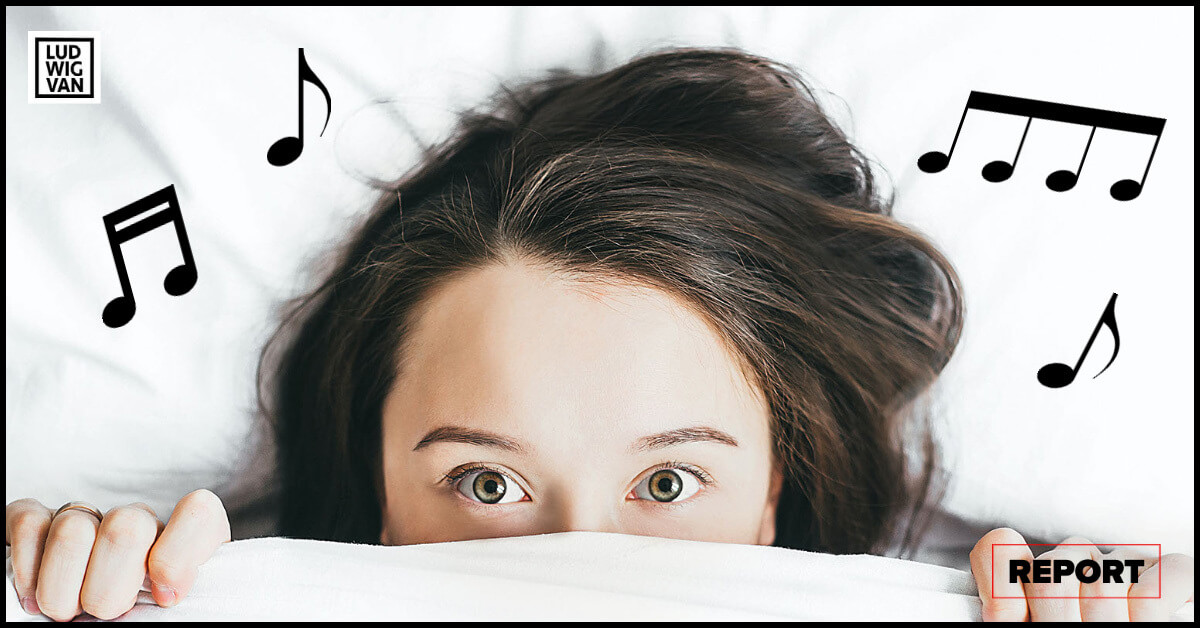
Many people listen to music to relax, even using it to try and help them to unwind and fall asleep at the end of the day. But, while the soothing strains of a favourite piece of music might appear to be a good way to relax and promote sleep, researchers at Baylor University in Waco, Texas, seem to have found the opposite.
Listening to music at bedtime can, apparently, keep you awake.
The Earworm Theory
Their paper, Bedtime Music, Involuntary Musical Imagery, and Sleep, was published in the journal Psychological Science.
“We investigated whether music listening affects sleep, focusing on a rarely explored mechanism: involuntary musical imagery (earworms),” researchers write.
As defined by a 2020 article in the journal Psychology of Aesthetics, Creativity, and the Arts, involuntary musical imagery (INMI or earworms) are, “the spontaneous recall and repeating of a tune in one’s mind.”
Results from 3,000 participants were surveyed, and the songs were analyzed according to 83 different parameters. What they found was a number of interesting commonalities in terms of the melodic contours that went into an earworm melody, and a faster than average tempo seemed to go along with that status.
The Methods & Results
The results of multiple experiments were commented on in the study.
Study 1 involved 199 people, with a mean age just under 36.
- Of the test subjects, who listened to music frequently, around 33% reported that the quality of their sleep often suffered because of earworms;
- The more music they listened to, the more likely they were to report sleep disturbances.
Study 2 involved 48 people, with a mean age just over 21.
- The subjects were randomly assigned to listen to pop music, some in an instrumental version, while others heard the lyrics sung as usual;
- Their sleep patterns were measured via a polysomnography test, which recorded brain waves, blood oxygen levels, breathing patterns, heart rate, and eye and body movements overnight;
- Perhaps surprisingly, listening to instrumental music actually amplified the effect, producing worsened sleep patterns due to earworms;
- That included a shift from deeper to lighter sleep patterns.
The subjects of both studies reported that the earworm effect could occur at bedtime, if they woke up during the night, or even on waking the next morning. It seems to point to the idea that the brain continues to process music during sleep.
In a third similar study, the brainwaves of the subjects were measured during sleep via electroencephalography (EEG).
- They observed an increased in the activity of a frontal area of the brain that is associated with how memory is consolidated while we sleep.
- In essence, the brain keeps replaying the song on its own, as a part of consolidating it into memory.
Michael K. Scullin, an associate professor at Baylor University and principal investigator at the Sleep Neuroscience and Cognition Lab, is quoted in PsyPost. “We found that 1/4 of people reported having an earworm either in the middle of the night or immediately upon awakening in the morning. That fascinated us. Why should someone have a song stuck in their head if they haven’t listened to music or been exposed to other environmental cues for many hours?”
When it comes to earworm melodies, it seems that our minds have a mind of their own.
#LUDWIGVAN
Get the daily arts news straight to your inbox.
Sign up for the Ludwig van Daily — classical music and opera in five minutes or less HERE.
- PREVIEW | Cellist Elinor Frey And London Symphonia Dive Into Jewels Of 18th Repertoire - April 25, 2024
- PREVIEW | The Hamilton Philharmonic Orchestra Says Good-Bye To Conductor Gemma New With Music - April 25, 2024
- THE SCOOP | Not-For-Profit Euterpe: Music Is The Key Received Three-Year Grow Grant - April 24, 2024



